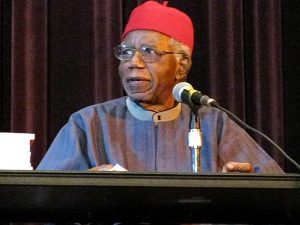First published in 1958, Things Fall Apart is a moving account of what happened in the late 19th century Nigeria when colonial Christianity arrived in Igbo society. The conflict is partly reflective of Achebe’s own background benefiting as he did from a Westernised education. It was – and remains – an extraordinary account of two cultures tragically misunderstanding each other. The underlying message is probably “All we need to do is to listen to each other” which is as relevant today as it ever was, given tensions with, for example, China and some Islamic groups.
And consider that 1958 date. Apartheid was, by then, well established in South Africa: the Sharpville massacre lay two years into the future. Segregation was the law in the southern states of the USA and it was just two years since Rosa Parks had made her famous stand on that Alabama bus. In Britain the law allowed landlords to display notices in their windows reading “No blacks”. Nigeria was still a British colony.
The structure of the novel fascinates me. It is presented in three parts like an elegant three act play. The first part ends with the seven year enforced exile of the central character Okonkwo to his mother’s home village as a punishment for contravening tribal law. The middle section describes his exile and the third takes him back home seven years later. And this novel has what must be one of the longest expositions in fiction. Achebe spends 121 pages of a 183-page novel showing how things are and how well they work before anything happens to change that. Thus we see marriage, death, birth, polytheism. farming, hierarchies, inter-village relations, justice, family arrangements and everything else which binds together the Igbo way of life. Then on page 121 we read that “a white man had appeared in their clan” … “riding an iron bicycle”. Briefed by their oracle who predicts very accurately that the white man would eventually mean trouble, the men of Umuofia kill him and that, of course, leads to retribution.
At first there are churches and for a while, an enlightened missionary who takes the trouble to get to know, and listen, to the Igbo people. Then he’s replaced by a blinkered evangelist and things begin to fall apart quite quickly. Of course, nothing about this is simple. Some Igbo people are attracted to the new religion. Okonkwo’s eldest son, for example takes the baptismal name Isaac (interesting choice given his troubled relationship with his father) and becomes a Christian. Moreover the missionaries bring schools and hospitals which seem to be a benefit. But they also bring law courts and a District Commissioner. Of course no British court was ever going to condone, for example, throwing away twins (dumping them alive in the forest) because they are cursed. The two sides don’t – in any sense – speak the same language. Corruption amongst the DC’s men works against the Igbo people too. And then, inevitably, it ends in tragedy. And, as in every literary tragedy you read the last page with a lump in your throat and the frustration that most of the novel’s suffering could so easily have been avoided.
It was always promoted as one of the greatest of 20th century novels but I haven’t heard anyone talking about Things Fall Apart for a long time now. We used to teach/read it a lot in secondary schools. In fact the copy I have, and have just reread, is one of those nice old Heinemann low budget, hard backed Windmill Series editions with an introductory note by Ian Seraillier, who was series editor. Such books used to be ubiquitous in English department stock cupboards. But this one seems to have fallen out of favour rather although I see it is still on the GCSE syllabus in Northern Ireland.
There may another reason for this. When I wrote my So You Really Want to Learn English series – class textbooks for age 10-13 in the early 2000s each chapter was based on a major extract. One of these was from Things Fall Apart. Then ten years later we did revised editions and the Achabe family network (he died in 2013) announced it wanted £2,000 for permission to use the passage – around ten times as much as anyone else was asking for at the time. So of course I had to use something else thereby depriving thousands of young readers of an introduction to this fine, important novel. Anyone would think that the people close to the author didn’t actually want the novel to be read by the next generation. If they make a habit of this greedy stance then it’s no wonder that the book is not now discussed much is it?
Oh well. Of course you can still buy it – I don’t think it’s ever been out of print. Let’s hope teachers are encouraging students to read it anyway because it really is a novel which matters.

Next week on Susan’s Bookshelves: Hotel du Lac by Anita Brookner